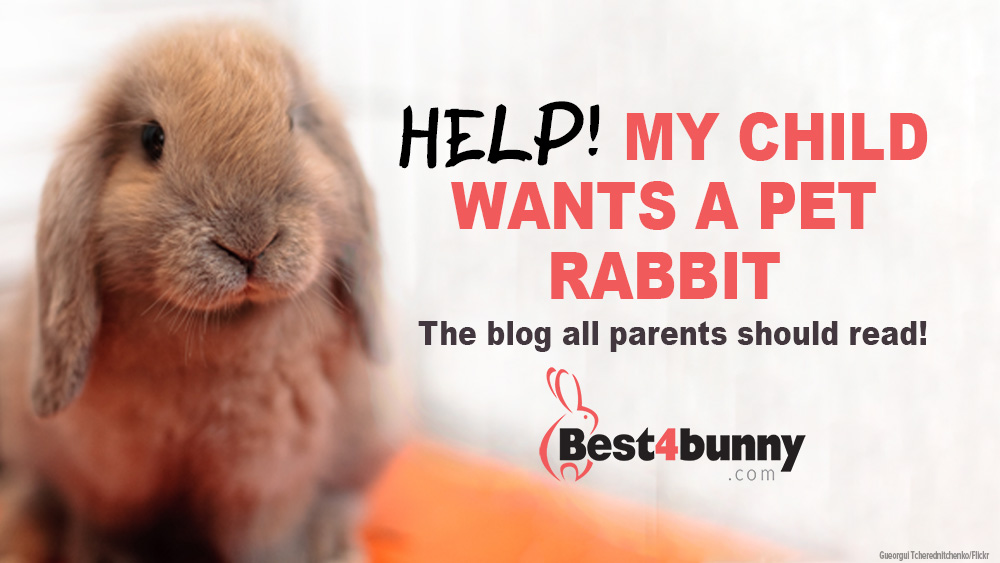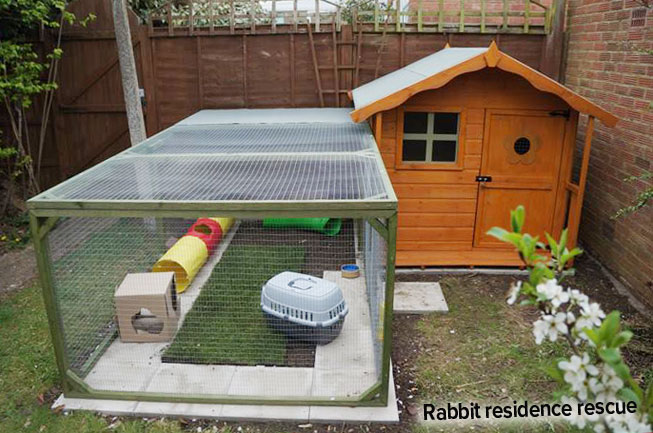
So your child desperately wants a pet rabbit of their own & all you are hearing is “Can I have a pet rabbit?”, “Please, please can i have a bunny?” Many children will be asking this question as soon as they can talk & it’s not surprising when they grow up with cute rabbits as cuddly toys, in cartoons & films & not forgetting Easter. Well, here is a blog to help parents (not the children) understand just what is involved with a pet rabbit and also questions parents should ask themselves (not the children) before you give your answer…
##In brief
Rabbits are fantastic, adorable, intelligent, funny, cheeky, loving & full of personality. But to see all these things in rabbits, you have to look after them correctly. That means giving them lots of love, care and attention, as well as providing them with a big spacious home & exercise area, that will need regular cleaning. You also have to have a lot of patience to earn the trust from your rabbit, before they become friendly & confident enough to trust you. There is a lot more to caring for rabbits than you may think.
Now ask yourself ‘Will a child be able to cope with this by themselves?’ Of course not! That is why all the family need to be involved when it comes to purchasing a rabbit.
##The most common mistake made
Is when parents buy a rabbit on the agreement their child/children will look after it themselves & it will be their responsibility only.
The problem here is, as we have already said, rabbits are not easy to look after & are too much for a child to look after on their own. Sadly many people only find this out after purchasing a rabbit (when it is too late). Also, it is very common that children are likely to lose interest in the rabbit, very quickly, leaving the parents to then care for the rabbit. Many parents decide they do not have the time and get rid of the rabbit.
This may seem harsh to some, but sadly it is reality. This is why it is so important for you to do your research, take your time & think properly about all that is involved with purchasing a rabbit, BEFORE you purchase one. Please do not think that it will be acceptable for you to leave it up to your child to look after the rabbit on their own. Unless the whole family are prepared to love & help look after the rabbit for the next 10+ years, then you should not purchase a rabbit.

##Bunny facts you need to know
###Rabbits are not cheap pets
The average cost of one rabbit per year is easily over £1000, even more if you buy a baby rabbit that needs to be neutered/spayed & vaccinated. Also in the first year, when you are buying a decent home and exercise area, that will add an extra £300- £800 on top of the £1000.
###Rabbits need a lot of looking after
Sadly many people think you just have to feed them twice a day & give them a cuddle – wrong. A rabbit takes even more care than what a dog does. If you are buying a rabbit for the reason they are less work & responsibility than a dog, then please do not buy one.
###A rabbit’s diet is not as easy as you think
Rabbit’s stomachs are very delicate, so it’s very important to know all about the correct daily diet. Did you know that rabbits need to eat a ball of hay the size of themselves every day & too many carrots are bad for bunnies?
###Rabbits are classed as exotic animals
So you will need to find a rabbit savvy vet that ideally specialises in exotic pets.
###Rabbits need to be neutered/spayed
Not just for the obvious reason. Even when you only have one rabbit, or you have two that are the same sex, you will still need to have them spayed/neutered. Once a rabbit is neutered/spayed they will become a much calmer bunny, they will keep to their toilet training habits, they will stop spraying urine everywhere, they will lose any aggressive & disruptive behaviour and they will live a much healthier life.
###Rabbits are very clean animals
Their homes will need cleaning out on a very regular basis. Once a week is not good enough and will cause many health problems.
###Many rabbits don’t like to be picked up.
Rabbits are prey animals and prefer their paws on the floor at all times. Many rabbits natural behaviour will be to bite or scratch if you pick them up, or they freeze from the stress. It’s much better to sit on the floor and have them snuggle up next to you.
###Rabbits need secure spacious homes and large exercise areas too
A hutch is no longer enough. The RWAF recommends the minimum hutch size of 6′ x 2′ x 2′ and this hutch should only be a shelter and not their only living space. It should be attached to a secure run of at least 8′ x 6′. But please remember, these are the bare minimum requirements. The more space they have, the more they can enjoy the life they deserve. Below is an example of an ideal bunny home.

###Rabbits love company
If they are left alone for long periods, day after day, they can become very depressed. If you can’t have two rabbits, then you should think about your rabbit becoming a house rabbit. That way they will get to enjoy your company for much longer periods, than what they would if stuck out in the garden all alone.
###Rabbits need to keep their minds active
It is so important to keep your rabbits mind stimulated. They can become bored very quickly & can then become either depressed or disruptive. So be sure to provide lots of fun toys for them to throw about and rabbit safe chew toys for them to happily demolish.
##Please ask yourself (not your child) these simple questions:
1.Do we as a family have the time to look after the rabbit?
2.Do we have enough space for the rabbit’s home & exercise area?
3.Will the whole family love & care for this rabbit for the next 10+ years?
4.Will the whole family treat this rabbit as part of the family?
**If you answer is no to any of the above, then a rabbit is not for you**
##Great ways to help you make the right decision
Help volunteer for a day at a local rescue (you & your family). This will help you gain an idea of what is involved with caring for bunnies. The rescue will be able to answer all your questions. Plus you can meet lots of adorable bunnies that are waiting for a forever home.
Find your local UK rescue [here](http://www.rabbitrehome.org.uk/centres.asp)
Find your local US rescue [here](https://www.petfinder.com/animal-shelters-and-rescues/search/)
##Do your homework & learn as much as you can before purchasing a rabbit.
You can read more about caring for bunnies on our Best4bunny care pages [here](http://best4bunny.com/bunny-care/)
##Adopt don’t shop
To adopt bunnies from a shelter is so very beneficial, in so many ways.
The rescue will arrange for the rabbit to be neutered/spayed & vaccinated.
They will be health checked for you and they will be able to tell you all about their personality too.
Many rescues have bunnies that are already litter trained & many bonded pairs, if you are able to have two.
Rescues have bunnies young & old, looking for homes. Mature bunnies are just as playful as baby bunnies, so please do consider adopting adult bunnies too.
**Thank you for taking the time to read this blog. We hope it has helped you.**
**All we ask is to please do your research & prepare the whole family to learn how to care for a rabbit correctly before you purchase one.**
**If you do decide to extend your family & adopt a bunny or two, be sure to let us know and post a picture on our Facebook page [here](https://www.facebook.com/Best4bunny/)**


